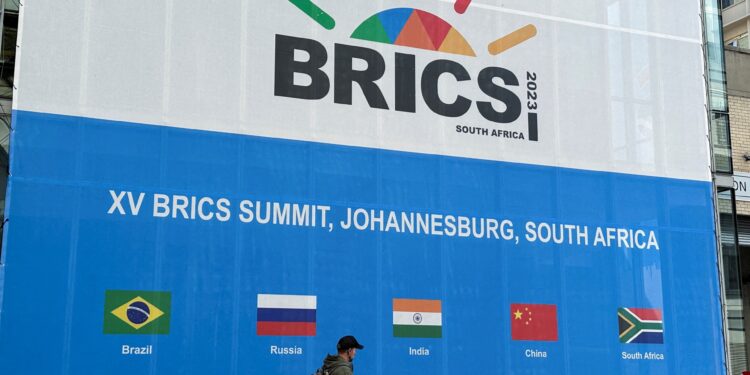The map of global economic and strategic alliances is changing rapidly, as the global system moves towards multipolarity.
In this context, the Bloomberg report highlights the ongoing transformations between major economic powers such as the Group of Seven (G-7) and the BRICS countries, and the impact of these changes on global politics and the economy.
The agency states that after Russia’s invasion of Ukraine in 2022, the G7 tightened its measures against Russia by imposing a ceiling on Russian oil prices and freezing Russian assets, while imposing sanctions on companies that try to evade these restrictions.
In addition, the group issued a statement criticizing China’s “non-market practices” and their negative impact on industries and workers in the group’s countries.
But the BRICS countries (Brazil, Russia, India, China, and South Africa) have begun to form a strong alliance seeking to enhance their global influence as an alternative to the G7.
The group recently expanded to include new countries such as Iran, the Emirates, Egypt and Ethiopia, with Saudi Arabia, Nigeria and Malaysia looking to join as well.
Despite bilateral tensions, such as border disputes between India and China, the BRICS member states are seeking to enhance economic cooperation, as the report indicated that India is seeking to attract Chinese investments to enhance its manufacturing capabilities.
According to the report, Kamala Harris’ victory in the upcoming US elections may lead to Washington’s continued efforts to drive the global agenda through the G7, while strengthening relations with some BRICS members such as India to counter Chinese influence.
On the other hand, the return of Donald Trump to the presidency may signal a return to more isolationist foreign policies, which is in line with the BRICS vision of multipolarity and issue-based cooperation rather than traditional alliances.
Reassessing China
The report says that in the United States, China is the common target of the Republican and Democratic parties regarding protectionist tendencies, and this matter complicates Japan and South Korea’s trade relations with China.
For example, major technology companies such as Samsung and Toyota face significant risks if further restrictions are imposed on semiconductor exports to China.
Bloomberg indicates that Japan and South Korea have begun to take steps to maintain their relations with China, despite the American challenges, as the leaders of the two countries met with Li Qiang, the second official in China, to enhance cooperation in supply chains and move forward with talks on a free trade agreement.
Conflict in Latin America
Latin America is witnessing an ideological division between Brazilian President Lula da Silva and the new Argentine President Javier Mele. When Lula won the presidential elections in 2022, this formed part of a wave of victories for leftist candidates in the region.
However, Milley, who assumed the presidency of Argentina in October 2023, presented a new model of governance that relied on strict austerity policies to reduce inflation, which reached 300%.
Although Millie’s harsh policies led to a decline in consumer spending and high unemployment rates, the inflation rate fell to 4% last July.
On the other hand, Lula seeks to achieve economic growth in Brazil after achieving strong results in the second quarter of 2024, which may ease the pressure on his government to implement harsh economic measures.
Bloomberg notes that this rivalry between Lula and Milley reflects the ideological division in Latin America, as each of them seeks to lead the region on different grounds. While Lula participates in international forums such as the BRICS summit, Milli tends to adopt policies that are less cooperative with international alliances.
Bloomberg concludes that these transformations demonstrate how the global system no longer depends on one pole, but rather is moving towards a multipolar world in which alliances are constantly changing.



